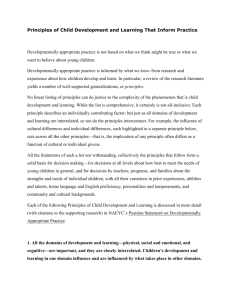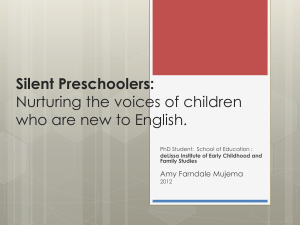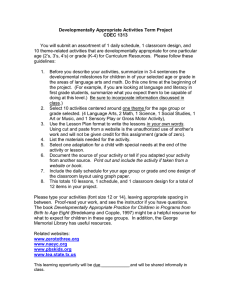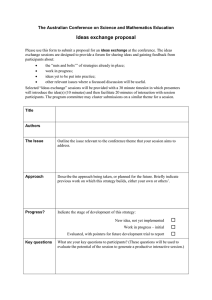THE Australian Early Development Index (AEDI) AND THE City of
advertisement
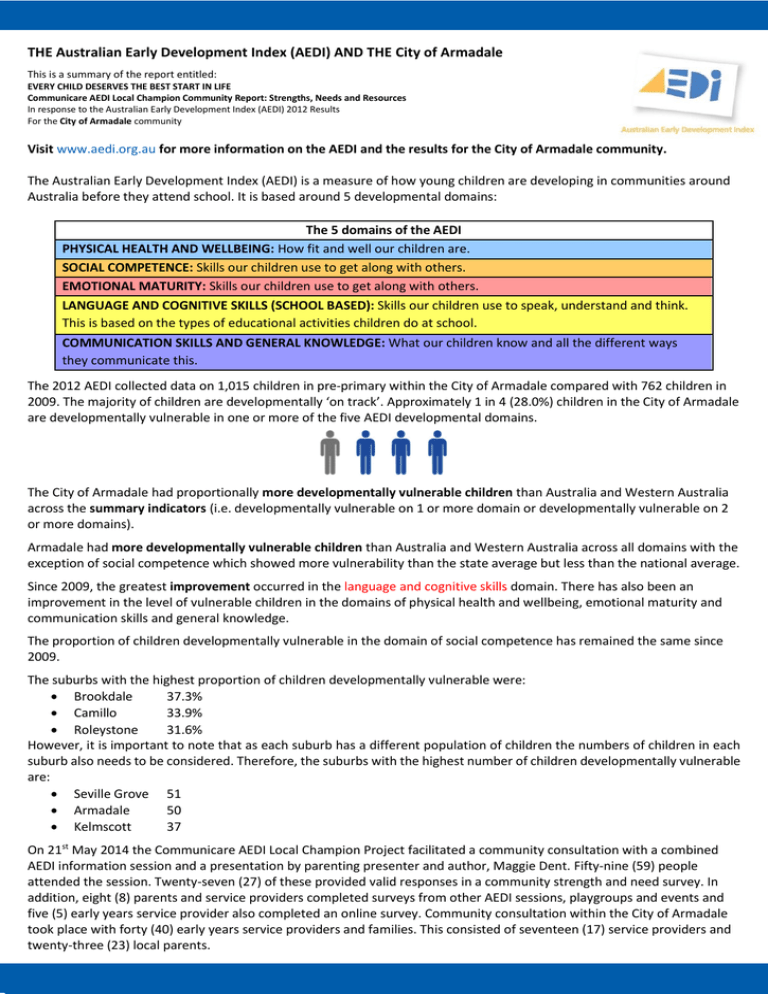
THE Australian Early Development Index (AEDI) AND THE City of Armadale This is a summary of the report entitled: EVERY CHILD DESERVES THE BEST START IN LIFE Communicare AEDI Local Champion Community Report: Strengths, Needs and Resources In response to the Australian Early Development Index (AEDI) 2012 Results For the City of Armadale community Visit www.aedi.org.au for more information on the AEDI and the results for the City of Armadale community. The Australian Early Development Index (AEDI) is a measure of how young children are developing in communities around Australia before they attend school. It is based around 5 developmental domains: The 5 domains of the AEDI PHYSICAL HEALTH AND WELLBEING: How fit and well our children are. SOCIAL COMPETENCE: Skills our children use to get along with others. EMOTIONAL MATURITY: Skills our children use to get along with others. LANGUAGE AND COGNITIVE SKILLS (SCHOOL BASED): Skills our children use to speak, understand and think. This is based on the types of educational activities children do at school. COMMUNICATION SKILLS AND GENERAL KNOWLEDGE: What our children know and all the different ways they communicate this. The 2012 AEDI collected data on 1,015 children in pre-primary within the City of Armadale compared with 762 children in 2009. The majority of children are developmentally ‘on track’. Approximately 1 in 4 (28.0%) children in the City of Armadale are developmentally vulnerable in one or more of the five AEDI developmental domains. The City of Armadale had proportionally more developmentally vulnerable children than Australia and Western Australia across the summary indicators (i.e. developmentally vulnerable on 1 or more domain or developmentally vulnerable on 2 or more domains). Armadale had more developmentally vulnerable children than Australia and Western Australia across all domains with the exception of social competence which showed more vulnerability than the state average but less than the national average. Since 2009, the greatest improvement occurred in the language and cognitive skills domain. There has also been an improvement in the level of vulnerable children in the domains of physical health and wellbeing, emotional maturity and communication skills and general knowledge. The proportion of children developmentally vulnerable in the domain of social competence has remained the same since 2009. The suburbs with the highest proportion of children developmentally vulnerable were: Brookdale 37.3% Camillo 33.9% Roleystone 31.6% However, it is important to note that as each suburb has a different population of children the numbers of children in each suburb also needs to be considered. Therefore, the suburbs with the highest number of children developmentally vulnerable are: Seville Grove 51 Armadale 50 Kelmscott 37 On 21st May 2014 the Communicare AEDI Local Champion Project facilitated a community consultation with a combined AEDI information session and a presentation by parenting presenter and author, Maggie Dent. Fifty-nine (59) people attended the session. Twenty-seven (27) of these provided valid responses in a community strength and need survey. In addition, eight (8) parents and service providers completed surveys from other AEDI sessions, playgroups and events and five (5) early years service provider also completed an online survey. Community consultation within the City of Armadale took place with forty (40) early years service providers and families. This consisted of seventeen (17) service providers and twenty-three (23) local parents. The Armadale community identified the following as the most common strengths by both service providers and parents for young children and their families1: Common theme 1: Accessible family support services (including playgroups) and parenting education Service providers said: Provide universal services that are free Playgroup for 0-4yo at school Parents said: Education and support groups available Play in the park Common theme 2: Library services Service providers said: Library activities Toy library Parents said: Great libraries Library – Better Beginnings program, story time etc. Common theme 3: Good parks and play spaces for children and families Service providers said: Beautiful play areas and environments Parents said: Plenty of outside parks and reserves Common theme 4: Diverse community organisations/services available in the area Service providers said: Centres such as Champion Parents said: Mulberry Tree Child Care Roleystone Common theme 5: Activities and events for children and families Service providers said: Free afternoon sport for the children Parents said: Many early years events Common theme 6: Community attitudes Service providers said: Passionate champions of the early years Parents said: Strong sense of community Common theme 7: Strong networks within the community Service Providers said: A strong AEYN [Armadale Early Years Network] Common theme 8: Services working with each other in partnership with families Service providers said: Collaboration between agencies & individuals working with families Parents said: Working together The Armadale community has also identified common community needs which are recommended to be addressed. These include1: • More child-friendly events and activities and ‘low-key’ parenting support and education “Free social events held in familiar, non-threatening locations” “More events and relationship building programs in Camillo” • More access to child health services and targeted family support services “More child health nurses and counselling services” “Parent Programs - Protective Behaviours” “Dealing with learning disabilities counselling” • More opportunity for safe, outdoor play and access to the natural environment for young children “More accessible nature play parks and bush areas” “Nature playground – more access to river” • ‘What’s on’ community advertising “Some advertising in the local day cares/schools to let people know about all the services available” “Better advertising of community events” • More sporting/exercise facilities and opportunities “Exercise for new mums” “More sporting clubs” • Consistency of services “Consistency to keep services running without a break due to funding” • Flexible and affordable child care “Affordable child care” • Community safety “Safety on the streets” HOW DO PEOPLE FIND OUT WHAT IS GOING ON IN THEIR COMMUNITY? The most common means of finding out what is going on in the community is via word of mouth followed by school/kindergarten/child care newsletter, Armadale Early Years Network (AEYN), local newspaper, online and library. Please note: From 1st July 2014, 2014 the Australian Early Development Index (AEDI) will be called the Australian Early Development Census (AEDC). For further information please visit the new website www.aedc.gov.au There will be a more extensive launch of the site later in 2014. 1 Please note only a selection of responses were included to represent comments made for each common theme

